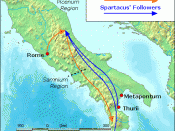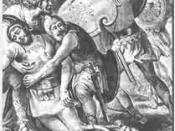Spartacus was born in Thrace (which is now in modern day Greece) in the first century BC as a freeborn provincial. He served as an auxiliary in the Roman Army in Macedonia where he then deserted the army and was outlawed, captured and sold into slavery. He was then purchased by Lentulus Batiatus and trained at a gladiatorial college in Capua.
In 73 BC Spartacus, along with 80 other gladiators fled the college to Mount Vesuvius, where he was joined by a large number of other slaves who were motivated by his courage to join him and help him fight against the Roman nobility.
In the course of two years Spartacus and his armies defeated five Roman armies and his forces overran Southern Italy.
In 71 BC Spartacus and his followers were forced into the narrow peninsula of Rhegium (now Reggio di Calabria) where, even though they escaped through the Roman Lines, Spartacus' army was destroyed and Spartacus was killed in battle.
With the death of Spartacus the uprising came to an end and the remaining captured rebels were crucified and left as signposts along the Appian Way (Capua-Rome highway) as a warning to Roman slaves.
The Romans in their histories downplayed the importance of the revolt led by Spartacus, as it was a threat to their world view (in essence of an empire predicated exploitation, slavery and terror), however it is important to realise that even Roman historians such as Plutarch still spoke of the "portents of Spartacus' greatness" and greatly respected him as a valiant general as well as a person of understanding and gentleness, and "superior to his condition" even if he wasn't a Roman.
While Spartacus may not have succeeded at the time, he inspired the hopes of Roman slaves, and many flocked...


